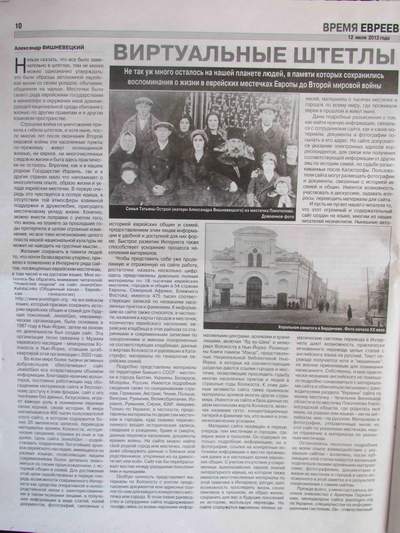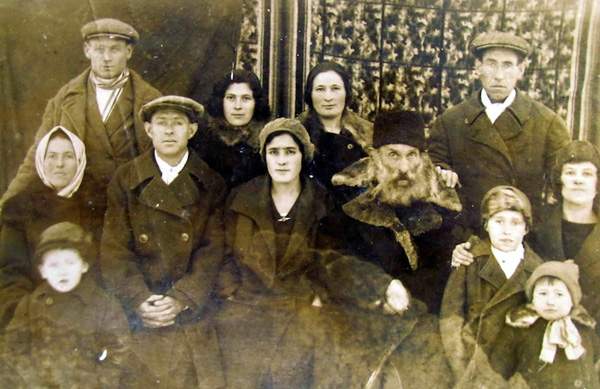Virtual Shtetl (*)
Note: The original article was published in Russian on the Israeli Russian newspaper "News of the Week" from July 12, 2012 and an shorter version was published on the website of the "Association of Concentration Camps and Ghetto Survivors in Israel".
This is the transcription (a corrected translation by Google) of the shorter version. To read it in Russian go
here
by Alexander Vishnevetsky
There's not too many people left which have preserved memories of life in the Jewish communities of Europe before World War II. I can not say that everything was fine in the shtetl, nevertheless, they were examples of an autonomous Jewish life with its way of life, customs, and communication in Yiddish. Towns were a kind of miniature Jewish state surrounded by a dominant national environment with other rules in another language space.
 The original article on the "News of the Week" newspaper
The original article on the "News of the Week" newspaper
The war led to the death of shtetl, and although now, after so many years after the Second World War, these villages live a full life, visible traces of the Jews and of their life are almost gone. However, as in our own state of Israel and in other countries, few is reminiscent of many years of experience, lifestyle and way of Jewish settlements. This is especially felt in the loss of Yiddish and in the absence of the atmosphere of mutual support and friendship inherent in small-town way of life. Of course, you can make adjustments for the fact that life over the years has undergone tremendous changes in general, but still the disappearance of a whole stratum of our national culture can drive to sad thoughts ...
The desire to keep in mind that almost irretrievably lost led to the emergence of the Internet sites devoted to the Jewish towns, including those in Russia. I would like to draw readers' attention to the site JewishGen KehilaLinks (Community Channel - The Jewish Genealogy)
http://www.jewishgen.org - in English, which is designed to preserve the history of Jewish communities and families.
Worldwide, more than a thousand active volunteers provide the JewishGen website growing volume of information. Thanks to the volunteers who are constantly working on enrichment materials from the site and free access to these funds, the site, with its dozens of databases, of course, plays an important role in understanding their Jewish roots of their history. In the world there are 400,000 users of this site, which contains more than 20 million records, transfer of materials since the Holocaust, historical information, excerpts from books.
The purpose of the JewishGen site is to help preserving the rich archives of Jewish Heritage, available in different languages, to enable our contemporaries in more detail to get acquainted with their origin, the history of communities and families. The site provides information in the form of articles, copies of documents, photographs, related to the history of Jewish communities and families.
To imagine the work already done and reflected on the work site, it is enough to name a few numbers: there are enough materials to complete 18,000 Jewish settlements, towns and communities in 54 countries in Europe, North Africa, Middle East, 475,000 place names and surnames, the number of Jewish population, Jewish cemeteries with ancient and modern accounts of graves and the names, data on victims of the Holocaust and Holocaust survivors; materials on genealogy of Jewish families.
More materials are on the territory of the former Soviet Union - the towns of the Baltic States, Ukraine, Belarus, Moldova, Russia. There are also details of the Scandinavian countries, Germany, Austria, Czech Republic, Poland, Hungary, Romania, Britain, Israel, Romania, Syria, South Africa, the Americas. Only in Ukraine there are contributions from two hundred villages and towns, which are listed in addition to historical records, information on births, marriages and deaths, census data, documents the war. On the site you can find his home town, or borough, and sometimes even find information about family members or relatives, lost due to old age or war. The site throws a bridge between past generations and the present.
Especially valuable are the materials on the Holocaust in the light of documents and links targeted on them for a particular town or city. In this regard, site management and staff maintain close contact with all the informative research centers, archives and repositories, including the "Yad Vashem" Holocaust memorial, and in New York. Books available memory "Yizkor," presented by the National Library of New York, in which the relevant section provides links the cities and towns, allowing to trace the fate of many communities and people in the terrible years of the Holocaust. According to these activists have also attracted the site archives materials in many other countries around the world. There is also a database of two million victims of the Holocaust, including the names of the ghetto, concentration camps and the names of those who live in subhuman conditions.
Provide detailed explanations on how to find information, contact the site, as well as any materials, documents and photos sent to him. The site may be an indication of e-mail addresses of correspondents to communicate or obtain relevant information from other persons on the history of families, the fate of the sought after the Holocaust. Site users can post pictures and documents relating to the history of their families and communities. There is an opportunity to participate in discussions, ask questions, translate materials for the site.
And don't be afraid that this great and informative site was created in a language that many of our readers unfamiliar. The current system of automatic translation on the Internet allow almost instantaneous transfer of entire articles from English into Russian. The text translation is obtained though "machine", but quite acceptable for the understanding of written material. Actually, my almost lack of English did not stop me to get acquainted with the materials of the site and to exchange letters with the leaders of the "Ukraine" site in my little town - Chechelnik in Vinnytsia region and the little town Pokotilov in Kirovograd region, where my mother was born, in their native languages ??- they write in English, I - in Russian. Materials and photos sent by me to this site for these towns, are published among the materials for these shtetls.
I will enter in more detail on my experience of interacting with this site - perhaps after the publication of this article, some of you will be willing to share your archival materials, photographs, documents the life of your towns and cities in the light of the above in this article, and as a result of familiarization with the site itself.
First of all, I have held part-time acquaintance with Ariel Parkansky, site manager for the JewishGen Ukraine, a specialist in information systems. He is - responsible for the content of Odessa on the said site, as well as for the little town Chechelnik. Prior to that he worked at the site of the Jewish communities of Argentina, which traced the genealogy of his family, whose roots are connected with Bessarabia and the Ukraine, where his ancestors emigrated in the early XX century. Genealogy includes 1550 individuals, 700 of them now live in 18 countries on four continents. Documents on the history of his family's reach, in some cases up to the XVII century. He was interested in the fate of relatives in the past, associated with the borough Chechelnik. With little information on the subject, he found in my article " Did the Jews in Chechelnik? ". Then came the said article with the filing of Ariel on the site of the Jewish community, at his request I sent him pictures of my family and some other materials. I also linked it to the Ukrainian journalist Larisa Shabelnik from the Chechelnik village, and the material on the site of the Jewish community was placed in the local newspaper Chechelnik, as well as on the website of the Jewish community.
But my relationship with the resource information is not limited to that. I received another letter from Sylvia Walowitz, who is responsible for the village Pokotilov and the town of Yampol. She received my email address from Parkansky Ariel, obviously, given the fact that in my article I wrote about Chechelnik and Pokotilov in Kirovograd region, where all Jews were killed during the Nazi occupation including my mother's father and her two sisters and their families. I sent her via Internet materials about Pokotilov and Yampol, found by me in Russian, and most importantly - photocopies carefully stored of my family before the war, pictures of my mom, her sisters and her father . All these materials are now displayed on the site community.
I'm immensely grateful to Ariel Parkansky and Sylvia Walowitz, as well as to all the organizers and volunteers of the site for they have given me the opportunity to perpetuate the memory of people close to me. I think that the same feelings about this resource are shared with me by other people. But even more than my sense of gratitude for the fact that the site preserves the memory dear to our hearts of the Jewish settlements, gone into oblivion. At least in this form our past will remain in the memory of man ...
Illustrations from the site jewishgen.org:

Pre-war photo of the family of my mother in the village Pokotilov
JewishGen KehilaLinks Site Address: http://www.jewishgen.org
Note: The article continues in a second page with an example on how to use JewishGen and to access to the KehilaLinks. This second page has not been published on the KehilaLinks but can be accessed here in original Russian
and here automatically translated by Google
----------------------------------
(*) This article is given in abridged form. Full version published in the newspaper "News of the Week" from July 12, 2012 in the application "Time HH."
----------------------------------